Pressure groups inquiry (A-Level Politics)
Home › Forums › Inquiry and resource design › Pressure groups inquiry (A-Level Politics)
Tagged: A-Level, Collaboration, Politics, Year 12
- This topic has 20 replies, 3 voices, and was last updated 4 years, 9 months ago by
 Jenny Toerien.
Jenny Toerien.
-
AuthorPosts
-
13th April 2020 at 12:05 am #4328
It’s that time of year again! Joe and I have been discussing how we will improve this Pressure Groups inquiry this year, on and off, almost since it finished last summer. In FOSIL terminology, we took our own ‘meta-‘Reflect stage very seriously and used it as a launchpad for (re-)designing our next inquiry.
Of course this year we have the added complication of needing to deliver the whole thing remotely during the coronavirus shutdown, but inquiry actually really lends itself to remote learning and we were pleased to discover that we would only need to make minor adjustments to make it suitable for remote learning through Microsoft Teams (our school’s chosen platform). I’ll come back to that in another post, but I wanted to share the LibGuide we have developed now, partly because I am really excited about it, and partly because it might be of use to other A level Politics teachers (or Librarians supporting them) thinking about how to teach F6 Pressure Groups during school closures. We had been planning to use a LibGuide before coronavirus came along, it is just a bit more comprehensive than it might otherwise have been. Note that resources from our subscription databases (such as the Politics Review articles) will only work for members of our School community, but there are plenty of resources on the guide that are available for free.
As a reminder (because this thread has become quite long), the subject objectives of the inquiry are that students emerge with:
- a good understanding of what makes a pressure group successful; and
- knowledge of a number of case studies of individual pressure groups that they can use as evidence in exam questions.
The FOSIL skills focus areas are:
- evaluating sources (through CRAAP testing);
- improving online searching skills; and
- developing evaluative skills by bringing together a range of different opinions from different sources to form a conclusion.
Last year students prepared for and debated the motion “This House believes that x is a successful pressure group”, where x was a different, named rights-based pressure group for each pair of students in the class. Then they designed their own new pressure group and explained why they thought it would be successful. The inquiry went well and we were largely happy with it, but there are always improvements that can be made.
This year we are going to keep the debate for rights-based groups, but replace the “own group design” exercise with writing an article that includes a case study of a (named, assigned) different type of group (Trade Unions, Think Tanks, Cyberactivists, Lobbyists and Corporations) as an entry for the Orwell Youth Prize. The theme of the prize this year is “The Future We Want”, so students will need to explain whether and how groups like this feature in the future they want. I will explain in later posts why we have made this change (and in particular why we chose this prize), what we hope to achieve and how we are supporting students (but there is quite a lot of detail on the LibGuide if you are interested).
Really excited about seeing how this goes, and whether the improvements make the differences we expect!
15th April 2020 at 8:32 am #4337The Pressure Group inquiry could not have come at a better time in our scheme of work this year. With remote learning the modus operandi for the foreseeable future, a guided inquiry is the perfect format for teaching in the Summer Term. Jenny and I have been revisiting this regularly for the past year, constantly updating our reflections and ideas on how to improve on the inquiry for Form 6 this time last year. The main focus would be to reinvent the second stage of the inquiry, which last year took the form of a ‘create your own pressure group’ task, in which students needed to apply the theory and evidence they had gathered during the first stage of the inquiry (investigation and debate on the two sides of ‘success/failure’ of a UK rights-based pressure group). Though this produced some breathtaking student work last year, we were concerned with how much utility it added in terms of exam-knowledge.
After some thought, we decided that the exam board specification called for a greater focus on different types of pressure group, and how they have evolved, particularly as one of the 30 mark essay questions on last year’s paper directly probed this area of the spec. The students will already have delved into rights-based pressure groups and the question of their success, so in the second phase of the inquiry, we would hone in on the democratic nature of the following different types of pressure group:
1. Trade Unions
2. Think Tanks
3. Cyberactivists
4. Lobbyists/Corporations
Jenny came up with the superb idea of an investigative journalism task early on in our reflection process. This would allow the creativity that we were so pleased with last year to remain, but would channel it into a specific aspect of knowledge acquisition for the pressure group topic. As time will be of the essence this term, we are minded to keep this second stage of the inquiry tightly-structured, useful, and student-led. Jenny has worked hard to redraft the frameworks for the student Investigation, Construct, Express and Reflect stages to ensure that students, no matter how good their remote learning access is, have a clear plan for their learning. The students will also have room to breathe in terms of following their own inspiration. All of the aspects we liked last year, such as the creation of a ‘product’, peer noting of the key elements of student work, and a meaningful reflection phase, are revamped into this new Orwell Prize task.
One more note on the remote learning aspect, which we are going to stress-test this year, is how well the debate (stage 1 of the inquiry) will work online, rather than face-to-face. Though stage 2 (sharing investigative journalism articles) should be simple enough online, the debate will be a good test of how classroom activities translate in the ether. My opinion pre-inquiry is that, with the well-structured and slightly-adjusted note-taking frameworks (more on that later, I’m sure) that Jenny has adapted, students will have the requisite structure to participate in the debate both as a debater and an audience-member.
The pressure group inquiry is due to begin during the first week of May.
20th April 2020 at 12:31 am #4349I have now uploaded the new inquiry journal (which isn’t designed to be issued as a single booklet, but as individual sheets – some of which may be filled in on screen if students prefer, and one of which should be printed on A3). Those familiar with the previous journal will not notice many differences over the first few pages (except that the first page is missing because I didn’t have access to a Word version of that!). The first substantial difference occurs on page 7 of the new journal (page 14 of the old – I have removed a lot of redundant repeat investigative journal pages because students can add these as they need them. I have also removed the CRAAP Testing Rubric because that is available separately and is not specific to this inquiry). Don’t forget that this journal is intended to be viewed in conjunction with our LibGuide , which explains how all the resources are intended to be used.
The first changes students this year will encounter are:
- The debate will need to take place on screen due to the Coronavirus school closures here in the UK, which is very different to debating in the classroom. To get things started we have therefore decided to ask students to produce a very short (90 second) opening statement, which they will then have a chance to respond to ‘live’.
- We decided that trying to make notes on others’ debates in highly structured sheets placed too high a cognitive load on students last year, and led to lack of detail in notes taken during the debate. This may have contributed to the fact that many then did not then really use evidence from others’ groups in subsequent essays. This year we have decided to reduce cognitive load by using a much looser Cornell-style note-making sheet, which allows students to organise the notes they make after the debate, rather than trying to do it as they are writing (see below for snapshot of page 7 from the new journal). We also decided we were asking for too much peer feedback at this stage and, as a result, it was poor. Peer feedback at this stage will be now done informally via Teams group chat.
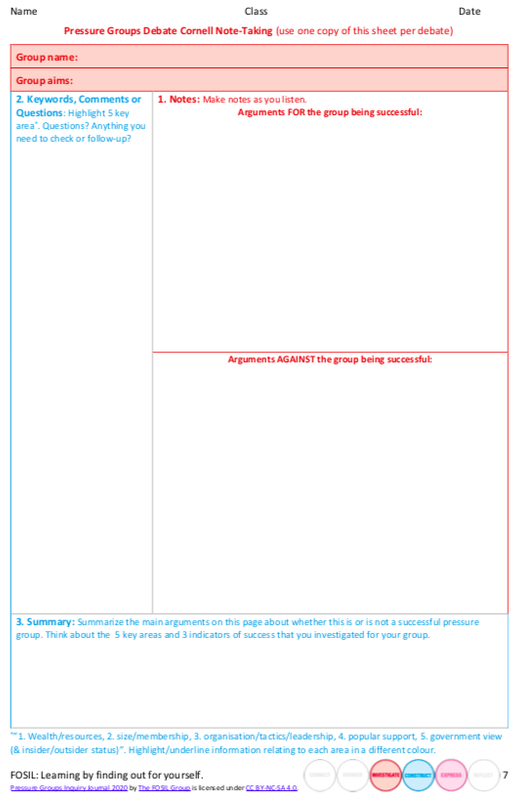
I’ll post another time about the substantial changes we made to the second half of the inquiry – and Joe may have comments of his own to add.
26th May 2020 at 7:09 am #4467Thanks to Jenny for her explanation of the changes, with particular focus being drawn to the Cornell noting-style document she kindly created for student use during each debate. Though the jury is still out (the essay I set at the end of the debates is due in after half term), I believe the new style of student-noting has already generated two key benefits;
1. Students feel they can ‘dump’ their knowledge as messily as they want during the debate in the Investigate section of the sheet, before colour-coding each success criterion after the debate in the Construct column, to aid comparison of the factors for pressure group success.
2. The other, more subtle, benefit of the new noting sheet is the sense of freedom it gives to audience members. There is no longer the sense of guilt for not filling out a particular success criterion. Instead, I have made it clear to students that some pressure group debates might not need to reference a factor (let’s say ‘Membership’) as it is not relevant to their success/failure. The original incarnation of the Express record sheet forced students to shoehorn their debate findings into each criterion regardless of relevance. The new version allows choice and illustrates to students that each pressure group case study offers different evidence.
Having modelled the level of detail I would expect from audience members during the first debate of each group, I left it to students to take responsibility for their notes. It was abundantly clear from the off that the more evidence students gleaned, the better their essays would be.
29th April 2021 at 8:38 pm #49731This very successful inquiry is about to run again for the third year. The joy of running something like this over a number of years is that it gets better every time AND the effort required to make it better becomes less. Last year’s adaptions proved very successful (as I am sure Joe will comment on later. I wasn’t involved in the delivery last year due to the COVID situation) so this year all we have needed to do is tweak the final task. The Orwell Youth Prize changes its focus every year. Last year it was “The future we want” and this year it is “A new direction: starting small”, which will work just as well as a vehicle for critiquing Pressure Groups of various kinds – I just needed to update the resources to reflect the new title and prize deadlines.
Joe asked me the challenging question “If you could improve one aspect of [the inquiry], what would it be?”. I think in one sense I am both too close to it (in terms of working on the resources) and too far removed from it (in terms of not having seen it in action last year) to make an informed comment at this stage. I am very happy with it as it is! However, in an ideal world (without the demands of the rest of the syllabus to contend with) I think the only change I would make is to move it slightly earlier in the year so that students who really wanted to would have enough time to work on a genuine entry for the Orwell Youth Prize before the ‘feedback deadline’ of April 26th (rather than just about being able to make the final deadline of June 4th). This is small criticism though of a tightly planned three week inquiry unit designed from scratch to guide students through an important unit of A level work – and one that worked just as successfully last year online as it had in the classroom and we are hoping will do so again this year in a potentially hybrid situation.
29th April 2021 at 9:13 pm #49739This is also a good opportunity to look in a bit more detail than I did last year at the LibGuide that supports the inquiry, which was one factor that made it very easy to deliver online at fairly short notice. The guide has four main tabs:
1. A basic introduction to the topic
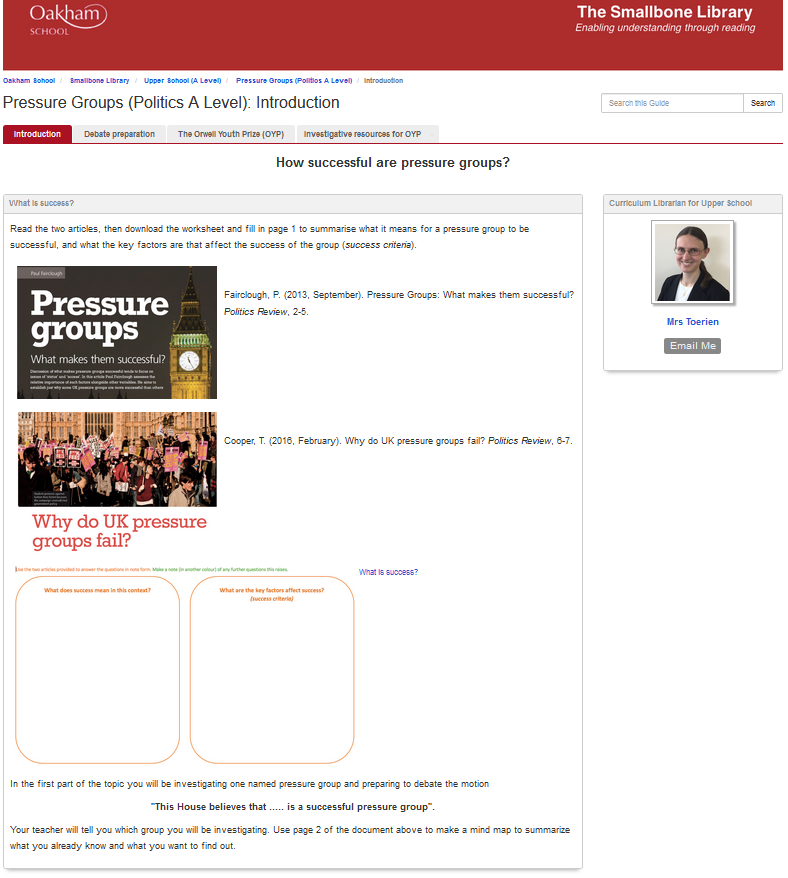
2. An introduction to the debate “This house believes that …. is a successful pressure group”, with note taking resources, search tips and advice on determining whether a source is appropriate (CRAAP testing). Students search for their own resources about their group, so this is the point in the inquiry most suited to developing information search and evaluation skills.
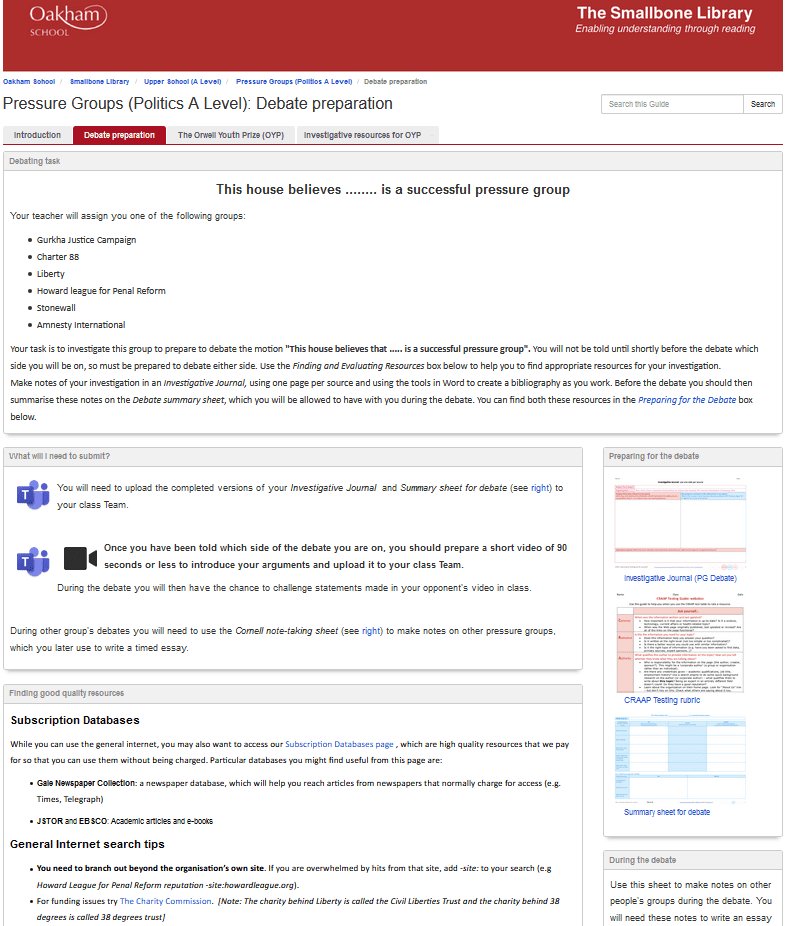
3. An introduction to the Orwell Youth Prize, explaining what students need to produce, giving information about the prize itself and giving students the resources they need both to plan their own articles and to work with other’s articles. The emphasis in this part of the inquiry is working with information and using it to develop arguments. To save time, students are not expected to find any of their own sources.
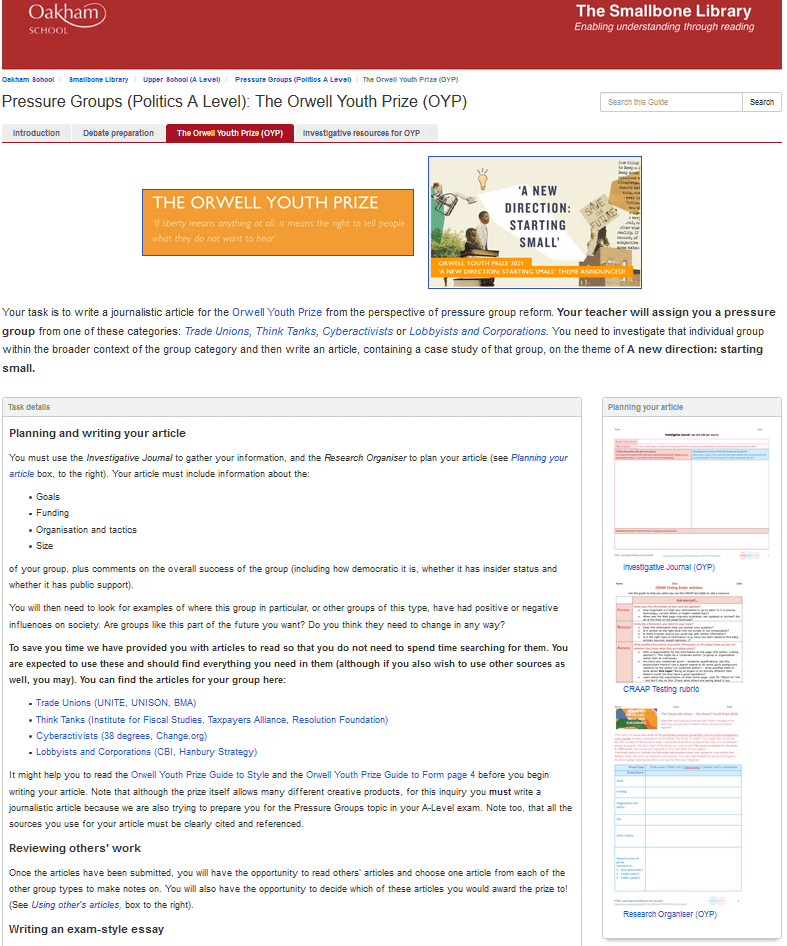
4. The last tab is actually a cluster of four – one for each type of pressure group looked at in this stage. Students are assigned to one type of group and then use the work of others to learn about the other types. These tabs have links to a carefully collated set of articles designed to allow students to critically evaluate the groups in question.
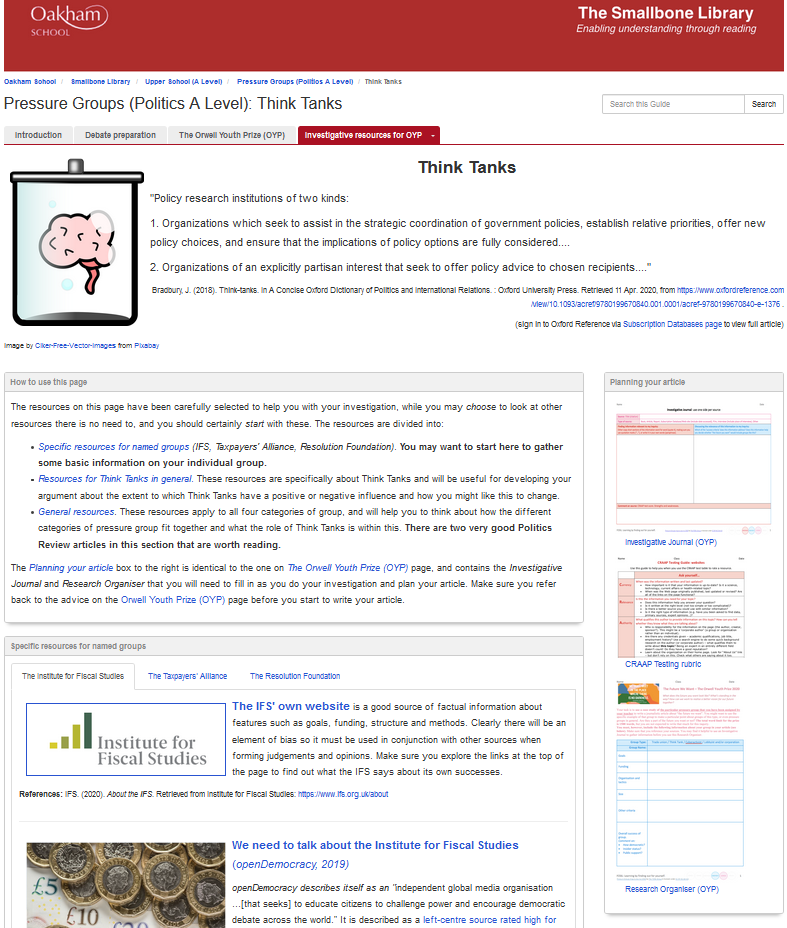
An important part of the presentation of the resources is the modelling of a very basic level of resource evaluation to encourage students to think about the source of their information as a matter of course.
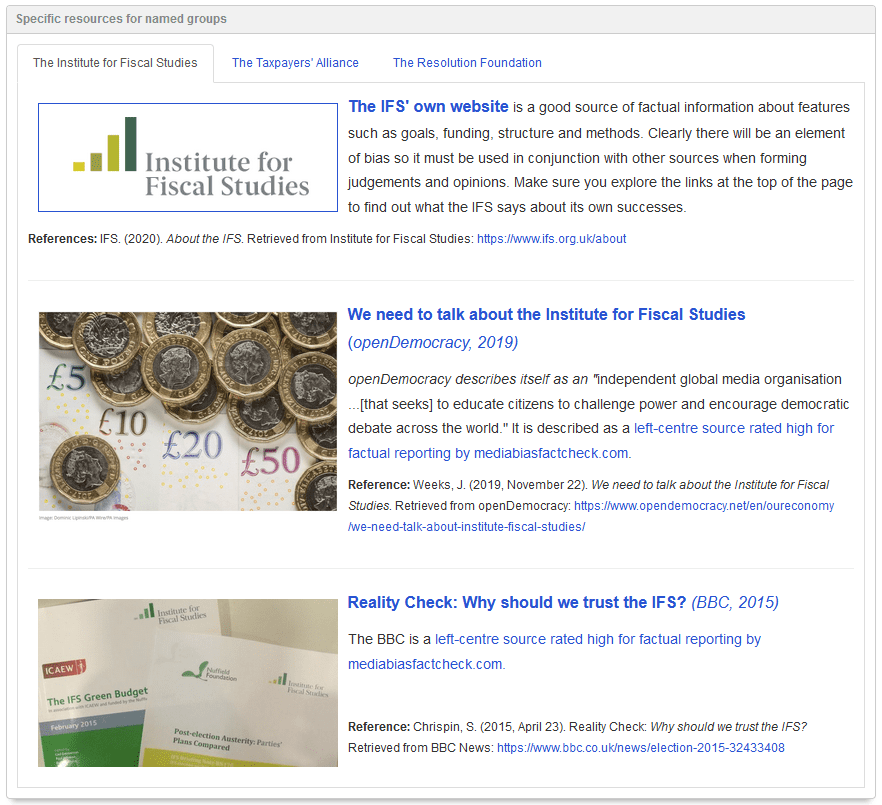
This is a technique I have recently used again in a LibGuide I produced for the Global Economic Governance A-Level Politics topic.
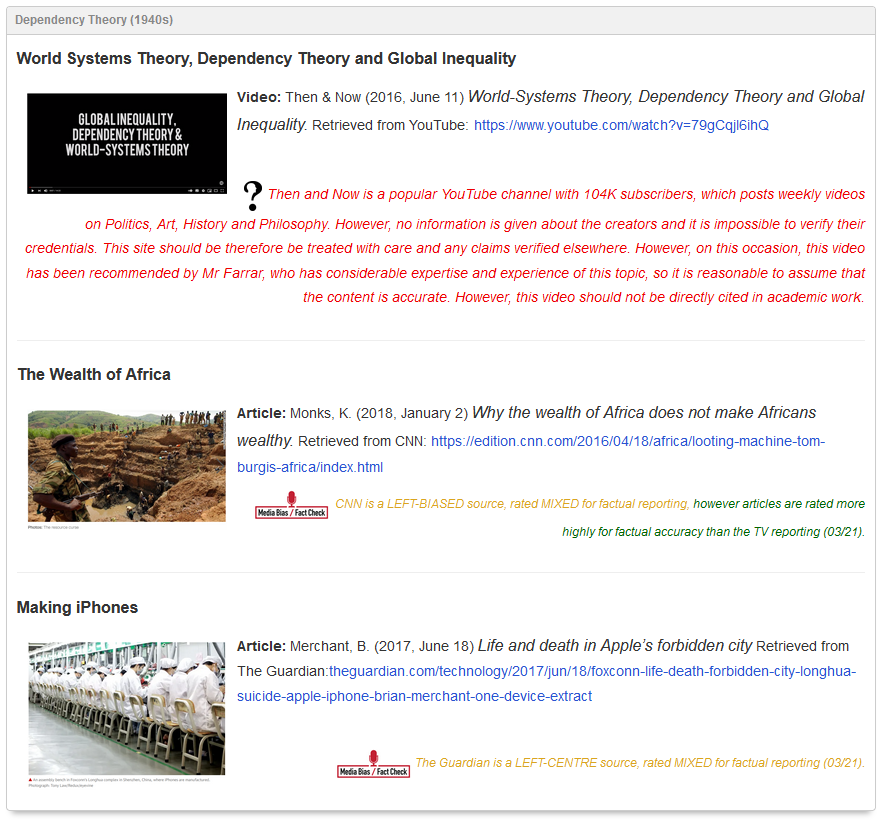
I think this kind of modelling is very important – as Librarians we are very used to providing curated sets of ‘trustworthy’ resources, but a step towards educating our students to locate such resources for themselves is explaining (in a relatively unobtrusive way) the merits and limitations of the resources we have curated.
-
AuthorPosts
- You must be logged in to reply to this topic.


